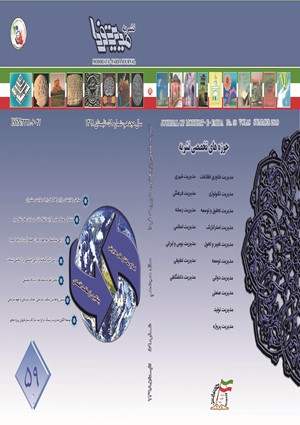The study of cyberlofing (unnecessary use of the Internet) in the workplace and its effect on employee productivity
Subject Areas :akbar bahmani 1 , ramzan gholami 2
1 -
2 -
Keywords: cyberlofing, work environment, productivity, Zamzam Company.,
Abstract :
The purpose of this study was to analyze the cyberlofing (unnecessary use of the Internet) in the workplace and its effect on employee productivity. The purpose of the present research is to apply the applied research group and is descriptive and descriptive in the research field. The statistical population of this research includes Zamzam employees with 1300 people. The statistical sample of the study was obtained using the law of 10 structural equations. A sample of 350 individuals was selected as a stratified sampling. The data gathering tool was a questionnaire. The reliability of the questionnaire was determined using Cronbach's alpha coefficient and combined reliability, and the validity of the questionnaire was confirmed using convergent validity and content validity using the knowledge of experts familiar with the research topic. Also, SPSS22 and Lisrel8.8 software were used to determine the relationship and data analysis. The results of data analysis have confirmed all the research hypotheses: personality factors, job requirements, job conflict, organizational policies, and organizational justice have a significant effect on cyberlofing. Also, the results indicate that cyberlofing will reduce the productivity of individuals in the company.
1. فرشته کاکلیان. (1392). بررسی پیامدهای مثبت سایبرلوفینگ در دانشگاه های شهرستان بابل. پایاننامه کارشناسی ارشد، موسسه آموزش عالی مهرالبرز
2. موسوی ارفع، مریم هنگامه و روحانی، سعید. (1392). بررسی و علل سایبرلوفینگ. رسانه و فرهنگ. سال سوم. شماره اول. بهار و تابستان 1392
3. Ahmadi, H. and F. Bagheri and S. A. Ebrahimi and M. NejadRokni and A. Safari and M. Kahrah (2011). ‘Deviant Work Behavior: Explaining Relationship between Organizational Justice and Cyber-Loafing as a Deviant Work Behavior’, Euro Journals Publishing, Vol. 24.
4. Ayşe Esmeray yogun. (2015). Cyberloafing and innovative work behavior among banking sector employees. International Journal of Business and Management Review. Vol.3, No.10, pp.61-71, November 2015.
5. Best, J., (1994), research methods in humanities, (Pasha Sharifi, H., Taleqani, N.) Tehran: Roshd Pub., 5thEd., p: 24.
6. Caplan, S.E. (2002). “Problematic Internet use and psychosocial well-being: development of a theory-based cognitive-behavioural measurement instrument”. Computers in Human Behaviour, 18, 553-575.
7. Freimark, O. (2012). The role of organizational citizenship behavior and organizational justice on intention to cyberloaf through a general deterrence. A dissertation submitted in partial fulfillment of the requirements for the doctor of philosophy degree in business administration.
8. Ahmad Aliyu Palladan(2018) Moderating Effects of Cyberloafing Activity on Innovative Work Behaviour and Lecturers Job Performanc,International Journal of Advanced Studies in Social Science & Innovation (IJASSI),vol2,no 1,pp28-49
9. .Lim,vivien and chen don(2012) Cyber loafing at the workplace: Gain or drain on work?, Research Collection Lee Kong Chian School Of Business, vol31,issu4,pp343-353
10. van Doorn(2011) Cyberloafing: A multidimensional construct placed in a theoretical
framework ,Industrial Engineering and Management Science, Department Industrial Engineering and Innovation Sciences.Series Master Theses Innovation Managemen, August 2011
11. Blanchard, L. A., & Henle, A. C. (2008). Correlates of different forms of cyber loafing:. Computers in Human Behavior,vol., 24, p.p. 1067–1084
12. Henle, A. C., & Blanchard, L. A. (2017). The Interaction of Work Stressors and Organizational Sanctions on Cyber loafing. Journal of Managerial Issues ,vol., 20, p.p.383-400
13. Meyer, P. J., Stanley, J. D., Jackson, A. T., McInnis, J. K., Maltin, R. E., & Sheppard, L. (2012). Affective, normative, and continuance commitment levels across cultures: A meta-analysis. Journal of ocational Behavior, vol., 80, p.p.225–245.
14. Farmer, J. S., Beehr, A. T., & Love, G. K. (217). Becoming an undercover police officer: a note on fairness perceptions, behavior, and attitudes. Journal of Organizational Behavior, vol., 24, p.p. 373-387


